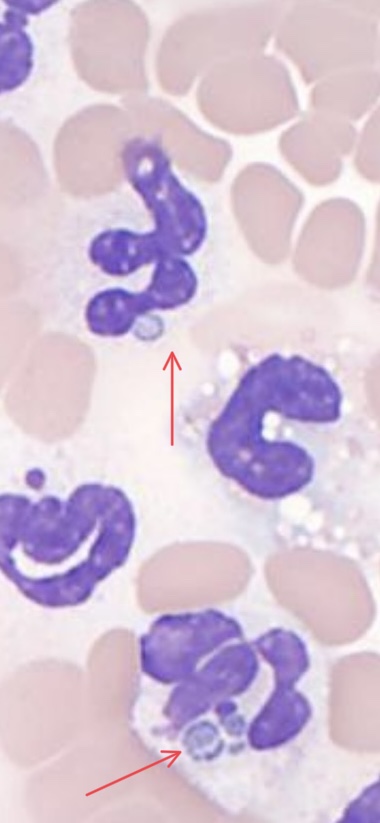(Photo courtesy of IDEXX Laboratories)
Anaplasma SSP.
As the medical director of Pets After Dark , I feel lucky to have a platform to speak to the veterinary community and I always jump at the opportunity to reach out, even if unsolicited. 😀 This goes for the whole pet community at large including not just pet parents, but also my colleagues in the veterinary profession. I love it when Pittsburgh veterinarians and veterinary technicians can come together and discuss emerging illnesses on a local level and then use our findings to benefit the general public and increase awareness. In other words, we have a nerd fest and then share with the public!
Just this week PAD had a meeting with one of the busiest North Side veterinary clinics and confirmed what I already suspected: anaplasmosis is on the rise. While anaplasma is not new, the number of symptomatic dogs is a new condition in our area. Anaplasma is a gram-negative rickettsial bacteria transmitted by a tick bite. The tick must remain attached from 24 to 48 hours in order to transmit the bacteria. Reassuringly most dogs will not exhibit any symptoms.
Interesting, recently I had several cases of dogs presenting with a fever and various symptoms of malaise ranging from lethargy to one extreme case of the dog having seizures. In one case a SNAP 4dx Plus Test from IDEXX Laboratories tested positive for the presence of anaplasma antibodies , which guided us in the right direction. However in another case that tested negative initially, my instinct made me dig a bit deeper as I had a strong suspicion of a tick-borne illness. During acute illness a 4dx test can be negative because the patient hasn’t yet had time to form detectable antibodies. I started the patient on Doxycycline while waiting for the results of a more in depth RealPCR test for tick-borne illness (IDEXX laboratories) that confirmed the acute infection. Mystery solved! 🤔
There is no vaccine to protect a dog against anaplasmosis and the only effective prevention is a solid tick preventive regimen: preventive medications available at your veterinarian given year-round, environment management ( keeping your lawn short, removing dead piles of leaves in your backyard and avoiding high risk areas) and routine tick checks. Prompt removal of ticks is an absolute must!
Hopefully by telling this story I can encourage my colleagues to continue their diligence when it comes to tick-borne illnesses. When a patient presents with seemingly vague symptoms, be on the lookout for tick-borne illnesses, especially if there has been a recent tick exposure.
Early treatment saves lives!
Dr. Caroline Simard-Swimmer
Medical Director and Co-Founder




